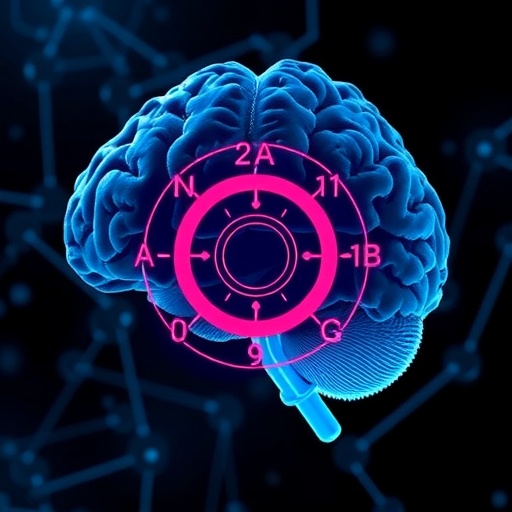In the rapidly evolving field of psychiatric medicine, a groundbreaking clinical trial announced by Hack et al. in 2025 promises to revolutionize treatment paradigms for depression by pivoting towards a precision medicine approach. This innovative study centers on targeting the α2A-adrenergic receptor agonism pathway, specifically tailored for patients manifesting the cognitive biotype of depression. The trial’s stratified design fundamentally challenges the traditional one-size-fits-all model of antidepressant therapy and exemplifies cutting-edge efforts to customize treatment based on neurobiological subtypes.
Depression, one of the most prevalent and disabling psychiatric disorders, has long been treated as a monolithic condition, despite its extensive heterogeneity. Researchers have increasingly recognized that depressive symptoms vary not only phenomenologically but also at a biological level. Cognitive impairments—such as deficits in executive function, working memory, and attention—characterize a distinct subset of depressed individuals and contribute significantly to their overall disability. The focus on the cognitive biotype thus pinpoints a crucial subset of patients for whom conventional antidepressants often prove insufficient.
The trial’s rationale emerges from accumulating evidence linking α2A-adrenergic receptors to the modulation of prefrontal cortex activity, a brain region critical for high-order cognitive processing. These receptors act as key regulators of noradrenergic transmission, influencing neural circuits related to attention, working memory, and cognitive control. Activation of α2A receptors has been shown in animal models to enhance neuronal signaling fidelity and improve cognitive functions impaired by stress or neuropsychiatric conditions.
Harnessing this neuropharmacological insight, the research team developed a stratified clinical protocol to evaluate the efficacy and safety of an α2A-adrenergic receptor agonist, administered selectively to participants characterized by their cognitive deficit profiles. Patients enrolled in the trial underwent rigorous cognitive and neuroimaging assessments to verify their eligibility based on the cognitive biotype classification. This stratification ensured that the intervention targeted individuals with neurobiological features suggestive of responsiveness to noradrenergic modulation.
The trial utilized advanced biomarkers and neuropsychological testing to not only confirm diagnosis but also monitor treatment response objectively. This approach underscores a growing trend in psychiatry toward biomarker-informed clinical trials, which aim to improve predictive accuracy and therapeutic outcomes. Importantly, the incorporation of two-photon microscopy and functional MRI provided in vivo evidence of receptor engagement and neural circuitry alterations induced by the α2A agonist.
Results from interim analyses are particularly compelling, showing a statistically significant improvement in measures of working memory, cognitive flexibility, and sustained attention among treated subjects compared to placebo. Functional neuroimaging correlated these cognitive gains with increased prefrontal cortex activation and normalization of noradrenergic signaling pathways. Furthermore, the trial reported a favorable safety profile, with minimal adverse events, reinforcing the therapeutic viability of targeting α2A receptors.
This precision medicine trial also contributes invaluable data on the heterogeneity of depression by delineating subtypes based on biological and cognitive phenotypes. By doing so, it sets a precedent for the future of psychiatric drug development, where interventions are custom-designed rather than empirically generalized. The methodology used—combining comprehensive phenotyping with molecular targeting—addresses a critical bottleneck in the field, that is, the high rate of treatment resistance and relapse experienced by patients with depressive disorders.
The implications of this research extend beyond therapeutic advances to the broader understanding of neuropsychiatric disease mechanisms. Delineating how α2A receptor agonism restores prefrontal cortical circuit integrity sheds light on the fundamental role of noradrenaline in cognitive processes and depression pathophysiology. Such mechanistic insights will likely inform new avenues of investigation into other cognitive disorders that share overlapping neurobiological characteristics.
Hack et al.’s study also raises important considerations about the integration of personalized medicine into psychiatric practice. It demonstrates the feasibility and clinical utility of stratified approaches rooted in precision diagnostics. This approach challenges mental health professionals to rethink diagnostic criteria, emphasizing neurobiological signatures alongside symptomatic presentation. Moreover, it heralds an era where psychiatric treatments can be optimized on an individual level, thereby maximizing benefit and minimizing unnecessary medication exposure.
The trial has succeeded in catalyzing enthusiasm for similar precision-targeted interventions across a spectrum of neuropsychiatric disorders. It exemplifies a model where interdisciplinary collaboration—uniting psychiatry, pharmacology, neuroscience, and computational biology—drives innovation. As it progresses toward full-scale clinical implementation, the study highlights the critical importance of investing in biomarker discovery, patient stratification, and mechanism-based therapeutics.
Moving forward, the research team plans extended follow-up studies to assess the long-term cognitive and functional outcomes of α2A agonist treatment. Additionally, efforts are underway to investigate potential synergistic effects when combined with cognitive behavioral therapies or other pharmacological agents. Such combination strategies may offer even greater improvements by targeting multiple facets of cognitive and mood dysregulation simultaneously.
Beyond its immediate clinical goals, this trial contributes to a growing scientific narrative underscoring the value of adrenergic receptors in neuropsychiatric conditions. It opens pathways for drug development focused on receptor subtype specificity, minimizing off-target effects and enhancing therapeutic precision. This focus aligns with broader trends in neurotherapeutics aimed at leveraging nuanced neurochemical systems rather than broad-spectrum modulation.
In conclusion, the stratified precision medicine trial targeting α2A-adrenergic receptor agonism represents a seminal advance in the treatment of the cognitive biotype of depression. By integrating molecular neuroscience with precision clinical methodologies, it ushers in a transformative era for mental health therapeutics. The study’s robust design, compelling preliminary results, and forward-thinking implications mark it as a landmark effort that promises to reshape our understanding and treatment of depression profoundly.
Subject of Research: The study focuses on a stratified precision medicine approach targeting α2A-adrenergic receptor agonism to treat the cognitive biotype of depression.
Article Title: A stratified precision medicine trial targeting α2A-adrenergic receptor agonism as a treatment for the cognitive biotype of depression.
Article References:
Hack, L.M., Jubeir, J., Hilton, R. et al. A stratified precision medicine trial targeting α2A-adrenergic receptor agonism as a treatment for the cognitive biotype of depression. Nat. Mental Health (2025). https://doi.org/10.1038/s44220-025-00510-7
Image Credits: AI Generated




